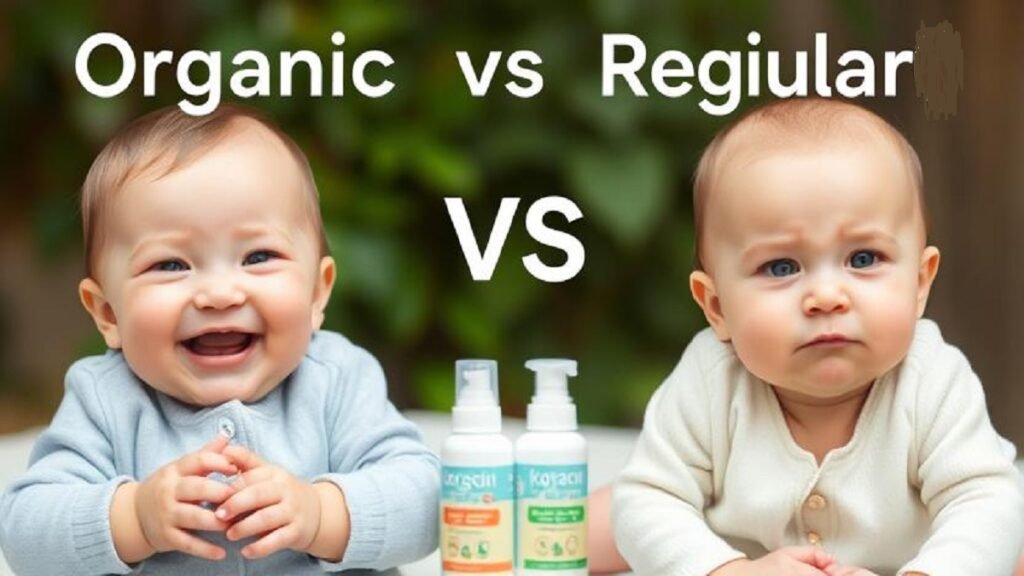
Introduction :
As a parent, choosing the best products for your baby is a top priority. One of the most common dilemmas parents face is whether to opt for Organic Baby Care Products or stick with regular ones. With increasing awareness of harmful chemicals and their effects on a baby’s delicate skin, many parents are shifting toward organic alternatives. But are they really better? Let’s dive deep into the differences, benefits, and drawbacks of both organic and regular baby care products to help you make an informed choice.
What Are Organic Baby Care Products?
Organic baby care products are made using natural ingredients that are grown without synthetic pesticides, fertilizers, or harmful chemicals. These products are free from artificial fragrances, parabens, sulfates, and other toxic additives. They often carry certifications from organizations like USDA Organic, Ecocert, or COSMOS Organic, ensuring their purity and safety.
Common Ingredients in Organic Baby Care Products
Aloe Vera – Soothes and hydrates sensitive skin.
Shea Butter – Moisturizes and protects against dryness.
Coconut Oil – Has antibacterial and antifungal properties.
Chamomile – Known for its calming and anti-inflammatory benefits.

What Are Regular Baby Care Products?
Regular baby care products are mass-produced and may contain synthetic ingredients, preservatives, and artificial fragrances. These products are generally more affordable and widely available in supermarkets and pharmacies. While many are dermatologically tested, some may still contain ingredients that could trigger allergies or skin irritation in babies.
Common Ingredients in Regular Baby Care Products
Mineral Oil – A petroleum-derived moisturizer.
Parabens – Used as preservatives to increase shelf life.
Artificial Fragrances – Can sometimes cause skin sensitivity.
Sulfates – Help with foaming but may strip natural oils from the skin.
Key Differences Between Organic and Regular Baby Care Products
1. Ingredients
Organic products use plant-based and natural ingredients, while regular products may contain synthetic chemicals.
2. Safety
Organic products are less likely to contain allergens and harsh chemicals, making them safer for sensitive skin. However, some babies may still have reactions to natural ingredients.
3. Effectiveness
Both types can be effective, but organic products are often gentler on the skin and promote long-term skin health.
4. Price
Organic baby care products tend to be more expensive due to their high-quality, natural ingredients.
5. Environmental Impact
Organic products are typically more eco-friendly, with biodegradable packaging and sustainable ingredient sourcing.
Pros and Cons of Organic Baby Care Products
Pros
✅ Free from harmful chemicals ✅ Gentle on sensitive skin ✅ Environmentally friendly ✅ Often cruelty-free and ethically sourced
Cons
❌ More expensive ❌ Shorter shelf life due to lack of preservatives ❌ May still cause allergies in rare cases
Pros and Cons of Regular Baby Care Products
Pros
✅ Affordable and widely available ✅ Long shelf life ✅ Often tested for dermatological safety
Cons
❌ May contain synthetic chemicals ❌ Risk of skin irritation or allergic reactions ❌ Potential environmental impact
Read Labels Carefully – Avoid harmful ingredients like parabens, phthalates, sulfates, and artificial dyes.
Check for Certifications – Look for organic certifications to ensure product authenticity.
Patch Test First – Before full use, test a small amount on your baby’s skin to check for reactions.
Consider Your Baby’s Skin Type – If your baby has eczema or sensitive skin, organic products may be the better choice.
Consult Your Pediatrician – If you’re unsure, ask your doctor for recommendations.
Final Verdict: Which Is Better?
There is no definitive answer to whether regular or organic baby care products are better—it all depends on your baby’s needs, your budget, and your personal preference. If avoiding chemicals and choosing eco-friendly options are your priorities, organic products are the way to go. However, if cost and availability are major factors, regular baby care products can still be safe as long as you choose high-quality, dermatologically tested brands.
Conclusion

The choice between organic and regular baby care products ultimately comes down to your personal values and what works best for your baby’s skin. No matter which you choose, always prioritize gentle, high-quality ingredients and conduct a patch test before introducing a new product into your baby’s routine. Have you tried both? Share your experiences in the comments below!
Organic baby care products are generally free from harsh chemicals, making them a safer choice for sensitive baby skin. However, regular baby care products can also be safe if they are dermatologically tested and free from harmful additives. The best choice depends on your baby’s skin type and your personal preferences.
Look out for parabens, sulfates (SLS/SLES), phthalates, artificial fragrances, and mineral oils in regular baby care products. These ingredients may cause skin irritation or long-term health concerns. Always read labels and choose trusted brands.
Check for certifications like USDA Organic, ECOCERT, or COSMOS Organic on the packaging. Also, read the ingredient list—organic products should contain natural, plant-based ingredients without synthetic additives.
